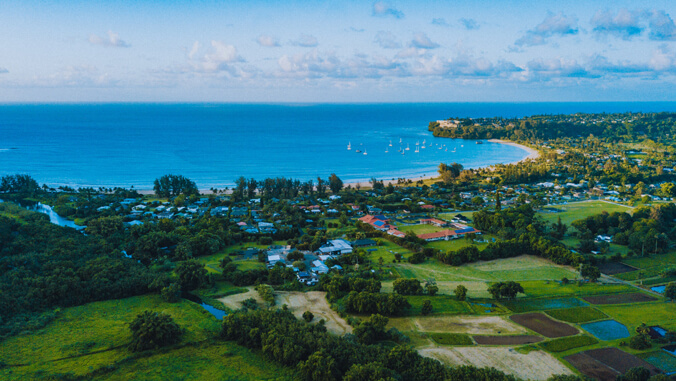‘Regenerative’ Tourism Makes Visitors More Attractive To Residents
“Regenerative” tourism is when visitors travel with a mindset to leave a destination better than it was before they arrived, and experiences go beyond a traditional vacation
 Hanalei Bay, Kauaʻi A new survey of 463 Kauaʻi residents, one of the first in Hawaiʻi that attempts to capture the residents’ perspective, suggests that regenerative tourism makes the tourism industry and tourists more attractive to residents. An overwhelming 96.3% of Kauaʻi residents responded favorably toward regenerative travel, and 98.7% responded favorably toward tourist attractiveness.
Hanalei Bay, Kauaʻi A new survey of 463 Kauaʻi residents, one of the first in Hawaiʻi that attempts to capture the residents’ perspective, suggests that regenerative tourism makes the tourism industry and tourists more attractive to residents. An overwhelming 96.3% of Kauaʻi residents responded favorably toward regenerative travel, and 98.7% responded favorably toward tourist attractiveness.
University of Hawaiʻi at Mānoa School of Travel Industry Management in the Shidler College of Business Professor and study co-author Jerry Agrusa said the survey results provide direct evidence for an underutilized type of tourism not often practiced and researched.
“Before COVID in 2019, there was actually a pushback by the residents of Hawaiʻi, they felt like there were too many tourists—the term ‘over tourism’ came up,” Agrusa said. “When COVID came and we locked everything down in 2020 and we had 200,000 people unemployed in one month, it was an opportunity to stop and say ‘let’s see what we can do to improve tourism from all stakeholders perspective including the residents when we open back up.’ One of the things that we were able to do is try to target the type of tourist that we want.”
Examples of regenerative tourism in Hawaiʻi, and specifically on Kauaʻi, include replanting native tree species to offset the carbon footprint that is produced by flying to Hawaiʻi, helping remove invasive plant species off hiking trails, working in a loʻi (taro patch) to experience first hand part of the Hawaiian culture, and helping to remove plastic and abandoned fishing nets off beaches. Regenerative tourism involves providing activities for visitors that will allow destinations to heal, while counterbalancing the social, economic and environmental impacts of tourism.
- Read more about the School of Travel Industry Management in UH News.
- Tourists visiting Kauaʻi should participate more actively in activities that help in reversing climate change (regenerative tourism)
- I would like spending time with tourists who participate in regenerative tourism activities (tourist attractiveness)
- The volume of tourists visiting Kauaʻi should be increased (residents’ support for tourism development)
- I would make direct criticism of tourists if they violate local guidelines on health and safety (travel shaming)
Among the major findings of the study included direct support for regenerative tourism by survey respondents:
- Regenerative travel positively affects residents’ support for tourism development.
- Regenerative travel positively affects tourist attractiveness.
- Travel shaming (especially during the pandemic) tempers the effects of regenerative travel on tourist attractiveness.
The study findings were published in a June 2022 Journal of Travel Research article.
—By Marc Arakaki
Publication: Umer Zaman, et al. Linking Regenerative Travel and Residents’ Support for Tourism Development in Kaua’i Island (Hawaii): Moderating-Mediating Effects of Travel-Shaming and Foreign Tourist Attractiveness. Journal of Travel Research (2023). DOI: 10.1177/0047287522109893
Original Story Source: University of Hawaii at Manoa

 Alerts Sign-up
Alerts Sign-up